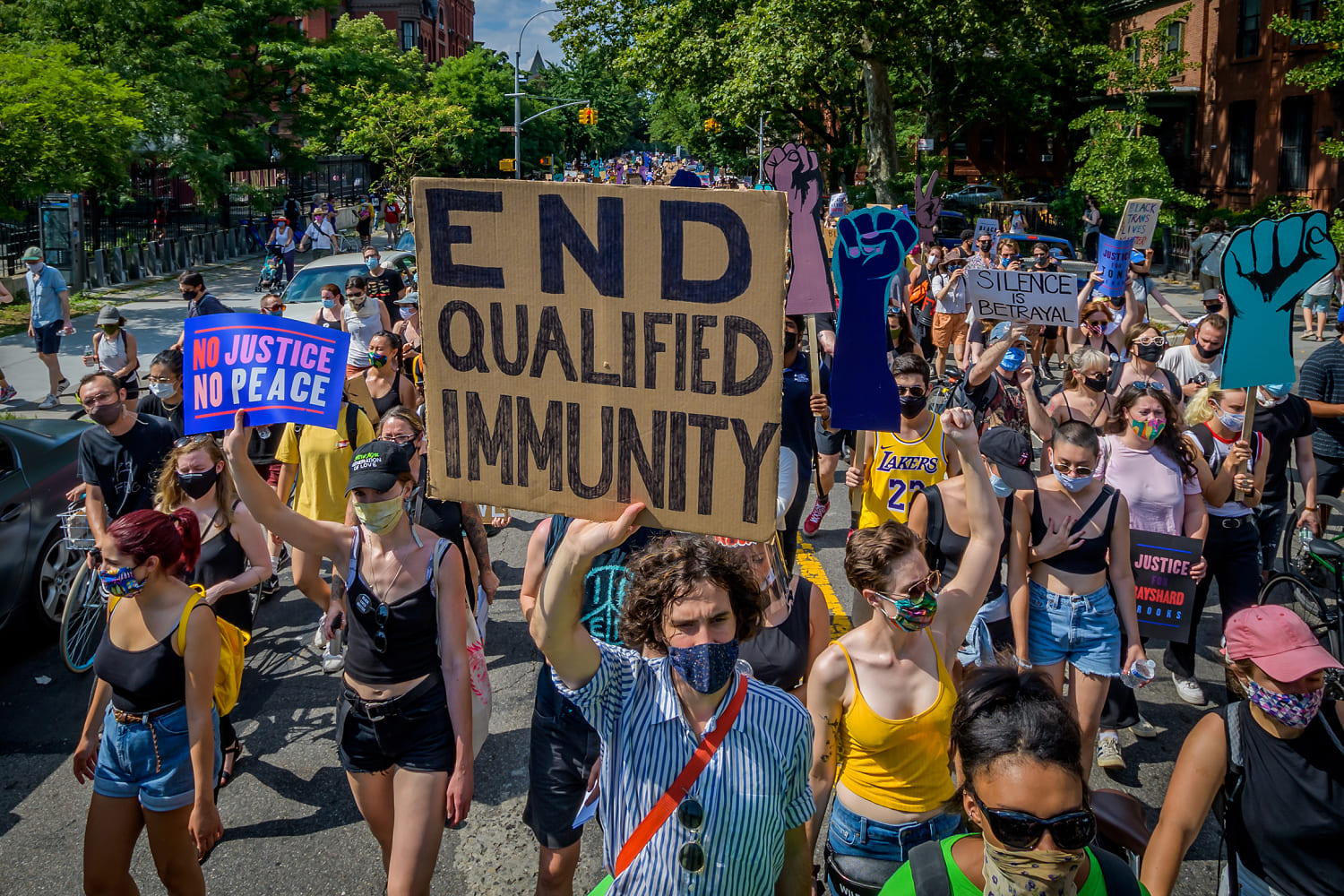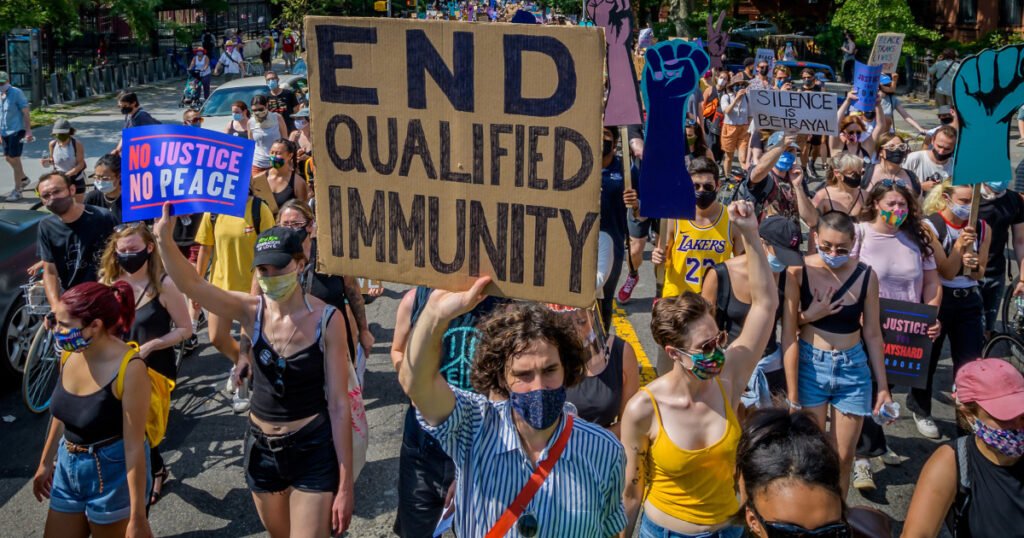Five years after George Floyd’s death, calls to reform qualified immunity mostly fall silent

WASHINGTON — The death of George Floyd at the hands of a police officer in May 2020 gave momentum to a cross-ideological effort to reform the legal defense known as “qualified immunity,” which can protect cops even when they have violated the Constitution.
Bills were introduced in Congress calling to abolish the defense.
Multiple cases piled up at the Supreme Court urging the justices to intervene.
Much ink was spilled.
And then, nothing happened.
With the fifth anniversary of Floyd’s death approaching this weekend, Congress still has not passed any legislation seeking to even reform, let alone abolish, qualified immunity. The Supreme Court has rejected dozens of cases asking it to do the same.
What minor changes have occurred, via court rulings or state legislative actions, have had little practical impact on a nationwide basis.
For Karen Blum, a professor at Suffolk University Law School in Boston and a long-term critic of qualified immunity, the situation is nothing short of depressing.
“After George Floyd, it was the first time I was actually optimistic and very positive that something would be done, no matter how little,” she said. “But nothing, I mean nothing, has happened.”
The doctrine, first adopted by the Supreme Court in 1967, gives government officials the benefit of the doubt when they violate the Constitution.
When a plaintiff files a federal civil rights claim, the defendant — including police officers facing excessive force claims under the Constitution’s 4th Amendment — can get off the hook by arguing that it was not “clearly established” at the time of the alleged violation that its actions were unconstitutional. If qualified immunity is granted, the lawsuit is dismissed and the plaintiffs never get a chance to either negotiate a settlement or go to trial.
In 2020, a Reuters investigation found that judges were increasingly granting qualified immunity at the direction of the Supreme Court.
The law enforcement community strongly defends the concept, saying it is needed to give officers acting in good faith the confidence to make split-second decisions, often in extremely dangerous circumstances.
The Fraternal Order of Police, a national group representing law enforcement officers, did not respond to requests for comment.
Egregious cases
Floyd’s killing by Derek Chauvin, a Minneapolis police officer, triggered an immediate national debate over police violence, especially against Black men.
But there had already been a quiet cross-ideological effort before then to reform qualified immunity, backed by such strange bedfellows as the left-leaning American Civil Liberties Union and the libertarian Cato Institute. They had filed briefs at the Supreme Court hoping to persuade the justices to take a new look at the doctrine and consider amending it — or maybe ditching it altogether.
For a few weeks in the summer of 2020, as racial justice protests raged, both the Supreme Court and Congress considered whether to take action.
The court quickly sidestepped the issue, declining in June 2020 to hear a series of cases asking for reconsideration of qualified immunity.
Ten days later, the Democratic-controlled House of Representatives passed The George Floyd Justice in Policing Act, including a number of police reform measures on qualified immunity and other issues. But it ran into headwinds in the Republican-controlled Senate and lost momentum.
“Republican intransigence was the real explanation there, and I don’t see any reason to think that has changed for the better,” said Clark Neily, a lawyer at the Cato Institute.
Rep. Hank Johnson, D-Ga., who was a co-sponsor of the George Floyd legislation, said that there were plans to reintroduce it during the current Congress but that he has “no confidence” it would get any traction with Republicans controlling both chambers.
“We will get to a time in this country where we will pass that legislation,” he said.
In the meantime, courts have continued to grant cops and other government officials qualified immunity in cases involving shocking claims:
- Police officers assisting a paramedic in Fresno, California, held a man in a prone position until he died, even after he told them he could not breathe.
- Police officers in Pineville, North Carolina, fired multiple shots at a man who was complying with their orders to drop a firearm.
- Prison officers at a facility in Columbia, South Carolina, failed to intervene when two men murdered four of their fellow inmates.
However, there have been small signs of incremental change.
Some judges have criticized the way qualified immunity has been applied, joining a handful who had done the same before 2020. That approach has seeped into some recent rulings, those following the case law say.
Chris Balch, a lawyer in Georgia who represents police departments in such cases, said the thumb on the scale in favor of officers “has lessened in the last five years,” meaning defense lawyers need to be ready to go to trial.
He cited a January 2024 ruling by the Atlanta-based 11th U.S. Circuit Court of Appeals that denied qualified immunity to a jail intake officer after a Black inmate who had disclosed he stabbed a white man for racially motivated reasons then murdered his white cellmate.
There was also a glimmer of hope for reform advocates at the Supreme Court, which in November 2020 ruled in favor of a Texas prison inmate who had been held in filthy conditions. The justices overturned a lower court that said qualified immunity protected prison officials.
After reform efforts failed in Congress, there was briefly a concerted effort to enact state-level legislation that would create an alternative way to sue officers under those states’ laws, making qualified immunity unavailable as a defense. Although a handful of states enacted such laws, the campaign met with considerable resistance elsewhere.
More recently, President Donald Trump’s re-election has in some ways sent the pendulum swinging in the other direction in the national political arena.
When Trump signed a pro-law enforcement executive order last month, he stressed the importance of ensuring officers are not held legally accountable for their actions.
The order says the Trump administration will take action to “provide legal resources and indemnification to law enforcement officers who unjustly incur expenses and liabilities” and calls on officials to “strengthen and expand legal protections” for officers.
Harrison Fields, a White House spokesman, said Trump’s policing plan shows he is “fulfilling his campaign promise to Make America Safe Again.” The administration is committed to reversing “failed policies” backed by Democrats, he added.
With that political environment in mind, Blum, the qualified immunity critic, remains pessimistic there will be any major change any time soon.
“Qualified immunity is here to stay,” she said.
You may be interested

Sen. Warren asks for contingency plans on national security after Trump and Musk’s social media fall out
new admin - Jun 07, 2025Sen. Elizabeth Warren is asking Secretary of State Marco Rubio for information on the Trump administration's contingency plans if billionaire…

Netflix will remove ‘heartwarming’ Florence Pugh movie very soon | Films | Entertainment
new admin - Jun 07, 2025Netflix users have just a fortnight left to stream one of Florence Pugh's breakout films before it's taken down.This might…

Gaza families mark Eid al-Adha amid destruction and loss
new admin - Jun 07, 2025IE 11 is not supported. For an optimal experience visit our site on another browser.Now PlayingGaza families mark Eid al-Adha…































